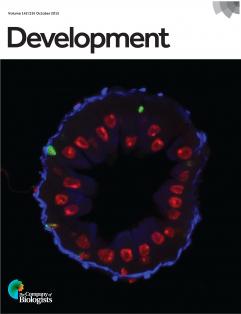Development:北京生命科学研究所袭荣文实验组发现肠内分泌细胞分

2015年10月7日, 北京生命科学研究所袭荣文实验室在 《Development》 杂志上以封面论文形式发表了题为“Ttk69 acts as a master repressor of enteroendocrine cell specification in Drosophila intestinal stem cell lineages”的文章。该论文报道了果蝇肠上皮干细胞分化过程中的命运抉择机制,发现转录抑制因子Ttk69是控制干细胞向肠内分泌细胞分化的关键抑制因子。此项研究在北京生命科学研究所完成,北京生命科学研究所(NIBS)与北京师范大学联合培养的王晨辉博士为该论文的第一作者。 其他作者还有郭兴庭、窦坤和陈红燕,袭荣文博士为本文通讯作者。
干细胞存在于多种组织和器官内,其特有的自我更新和多分化潜能使它们具有长期维持组织器官的稳态、修复和再生的能力。组织特异干细胞可以分化产生同一组织中所有的或多种特化的细胞类型,而除了功能方面的差异外,这些不同的细胞类型在数量、分布样式和寿命等方面都可以有很大的区别,其背后的分子调控机制我们还知之甚少。果蝇的肠上皮干细胞维持着中肠上皮的新旧更替,它们产生的未分化细胞可以走两条截然不同的分化途径,一是分化为肠细胞,一是分化为肠内分泌细胞。因此这些未分化细胞被认为经过了一个命运的抉择。在这篇论文中,作者通过遗传筛选,发现Ttk69基因的失活可以导致所有未分化细胞选择内分泌细胞命运,使内分泌细胞在肠上皮中大量堆积,进而形成内分泌细胞样瘤。已知在正常情况下Notch的激活决定了未分化细胞向肠细胞而不是肠内分泌细胞分化。有趣的是,在Notch激活的未分化细胞中抑制Ttk69的功能足以使该细胞的命运发生转变并分化为肠内分泌细胞。进一步的研究发现Ttk69并不是简单在Notch下游起作用,而是可能与Notch 通路并行调控着细胞命运的抉择过程。在这篇论文中,在Ttk69下游起作用的、由一系列转录因子组成的调节通路也得到了解析。该论文发现了一个重要的中肠内分泌细胞的抑制因子。这一发现为进一步理解肠上皮干细胞分化时的命运抉择机制及细胞可塑性的分子基础奠定了基础。另外,由于肠上皮干细胞谱系的细胞类型和调控机制在果蝇和哺乳动物中有很高的相似性,该研究发现也对理解人类肠上皮干细胞谱系的分化机制及肠内分泌肿瘤等疾病的分子机制等具有一定的参考意义。
原文链接:
Ttk69 acts as a master repressor of enteroendocrine Cell specification in Drosophila intestinal stem cell lineages
原文摘要:
In adult Drosophila midgut, intestinal stem cells (ISCs) periodically produce progenitor cells that undergo a binary fate choice determined primarily by the levels of Notch activity that they receive, before terminally differentiating into enterocytes (ECs) or enteroendocrine (EE) cells. Here we identified Ttk69, a BTB domain-containing transcriptional repressor, as a master repressor of EE cell specification in the ISC lineages. Depletion of ttk69 in progenitor cells induced ISC proliferation and caused all committed progenitor cells to adopt EE fate, leading to the production of supernumerary EE cells in the intestinal epithelium. Conversely, forced expression of Ttk69 in progenitor cells was sufficient to prevent EE cell specification. The expression of Ttk69 was not regulated by Notch signaling, and forced activation of Notch, which is sufficient to induce EC specification of normal progenitor cells, failed to prevent EE cell specification of Ttk69-depleted progenitors. Loss of Ttk69 led to derepression of the acheate-scute complex (AS-C) genes scute and asense, which then inducedprospero expression to promote EE cell specification. These studies suggest that Ttk69 functions in parallel with Notch signaling and acts as a master repressor of EE cell specification in Drosophila ISC lineages primarily by suppressing AS-C genes.
作者:袭荣文

